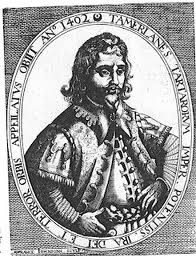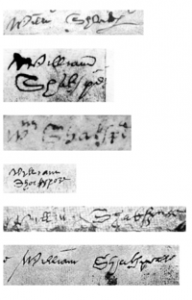The fable of the crow in borrowed feathers was well known to Elizabethans, who believed it to be by Aesop[1] and associated it with plagiarism; putting one’s name on something that is not your own work. Greene had referred to it in this context in an earlier pamphlet, Mirror of Modesty (1584):
Your honor may think I play like Aesop’s Crow, which decked his self with others’ feathers, or like the proud poet Batillus, which subscribed his name to Virgil’s verses, and yet presented them to Augustus.
Here we see Batillus, again, as someone whose name is on the poetry of others. And he is linked to the Crow, ‘beautified with [others’] feathers’.
Green’s upstart Crow, this actor who has has the temerity to believe he’s ‘as well able to bombast out a blank verse as the best of you’ is believed to be Shakespeare on two specific grounds. Firstly, Greene tells us that the Crow thinks himself ‘the only Shake-scene in a country’; a neat nickname for a man whose name was frequently represented as ‘Shake-speare’. Secondly, with his ‘tiger’s heart wrapped in a player’s hide’, Greene adapts a line from the play that would become Shakespeare’s Henry VI Part 3. For most people, this is case closed.
An accusation of plagiarism fits neatly with Shakespeare’s early publication record, including the apocrypha. At this point, nothing with the name William Shakespeare upon it, nor any of the plays we would later know as his, had been published, but this is not to say he hadn’t begun adopting and adapting. So you might wonder why I question the identification of the upstart Crow as Shakespeare when not only orthodox scholars, but also most non-Stratfordians, have taken it up with great relish. The reason why I and some others question it is because there was someone for whom Greene had worked who is a much better fit.
A Plagiarising Actor
 Shakespeare wasn’t the only plagiarist in town. As we have seen, accusations of plagiarism were rife, because the practice of copying from better writers was inculcated into every Elizabethan schoolboy as a mainstay of their Humanist education. Nor is William Shakespeare the only candidate for an actor of Greene’s acquaintance who believed, like a ‘Johannes fac totum’ (Jack of all trades), that he could bang out a play or two himself. From April to June 1592, as Greene was falling ill, Lord Strange’s Men—for whom Greene had recently been writing—were playing a two part play called Tambercam. Though the title sounds similar, this was not Marlowe’s hugely successful Tamberlaine, whose title role Edward Alleyn had made his own as leading actor of the Lord Admiral’s men some years earlier. But its thrust was similar: it is thought to have been about another ruthless Asian warlord, Gheghis Khan. Its style was similar, too: Ben Jonson lumped these plays together when he complained about
Shakespeare wasn’t the only plagiarist in town. As we have seen, accusations of plagiarism were rife, because the practice of copying from better writers was inculcated into every Elizabethan schoolboy as a mainstay of their Humanist education. Nor is William Shakespeare the only candidate for an actor of Greene’s acquaintance who believed, like a ‘Johannes fac totum’ (Jack of all trades), that he could bang out a play or two himself. From April to June 1592, as Greene was falling ill, Lord Strange’s Men—for whom Greene had recently been writing—were playing a two part play called Tambercam. Though the title sounds similar, this was not Marlowe’s hugely successful Tamberlaine, whose title role Edward Alleyn had made his own as leading actor of the Lord Admiral’s men some years earlier. But its thrust was similar: it is thought to have been about another ruthless Asian warlord, Gheghis Khan. Its style was similar, too: Ben Jonson lumped these plays together when he complained about
‘the Tamerlames and Tamerchams of the late age, which had nothing in them but the scenical strutting and furious vociferation to warrant them’.
A decade after Groatsworth was published, Edward Alleyn began selling playbooks to his company, the Lord Admiral’s Men. In October 1602, his father-in-law Philip Henslowe, who acted as a kind of banker for the company, noted in his account book that he paid 40 shillings (£2) ‘unto my son E Alleyn at the appointment of the company for his Book of Tambercam.’ The entry is repeated (with the same date) eleven pages later.[2] In both cases, Henslowe uses the possessive pronoun relative to his son-in-law: Tambercam is ‘his book’. Elsewhere he pays Alleyn for ‘a book’ or ‘the book’. Only in the case of Tambercam is the book referred to as ‘his’.
Different rules for Shakespeare scholarship?
In every other instance where Henslowe uses the possessive pronoun in his account book, scholars accept that he is paying a playwright for their own creation. Just above the second entry paying Alleyn 40 shillings for ‘his Book of Tambercam’, the company made a part-payment of the same amount for ‘a tragedy called the Two Brothers’, and ten days later there is a second entry of 40 shillings ‘unto Mr Smith’ for ‘his Book called the 2 Brothers Tragedy’. The Two Brothers (sometimes know as The Three Brothers) is an acknowledged work of Wentworth Smith on this evidence. In July of 1602, Thomas Dekker received a part-payment of 40 shillings for ‘his comedy called Medicine for a Curst Wife’; Thomas Middleton, John Day and Henry Chettle all receive payments for ‘his play’, or ‘his book’ or ‘his tragedy’ and all cases, scholars have accordingly accepted their authorship of the items named.
Why should an exception be made in the case of Edward Alleyn? Other actors turned their hand to writing with greater or lesser degrees of success, including Ben Jonson, Robert Armin and Edward Juby. Is it not possible that Tambercam was Edward Alleyn’s attempt to create for himself, this time from his own pen, another role as powerful as Tamberlaine? Could Edward Alleyn, rather than William Shakespeare, be the target of Greene’s complaint?[3]
[1] It was in fact, from Horace’s third Epistle, where he warns his friend Celsus ‘not to pilfer from other writers any longer, lest those he has robbed should return one day to claim their feathers, when like the crow stripped of its stolen splendour, he would become a laughing stock.’ J.Dover Wilson traced the source of Greene’s reference, and many other examples of Elizabethans using ‘Aesop’s’ crow to indicate plagiarism, in his article ‘Malone and the Upstart Crow’, Shakespeare Survey Vol 4 (1951), pp 56-68.
[2] Whether the duplicate entry was a mistake, a genuine double payment, or an act of ‘creative accounting’ is unclear.
[3] That the subject of Greene’s rant might not be Shakespeare was first advanced by A.D.Wraight (1993) and recently developed by Daryl Pinksen (2009).
Click Here to Subscribe and we’ll notify you about new content.
